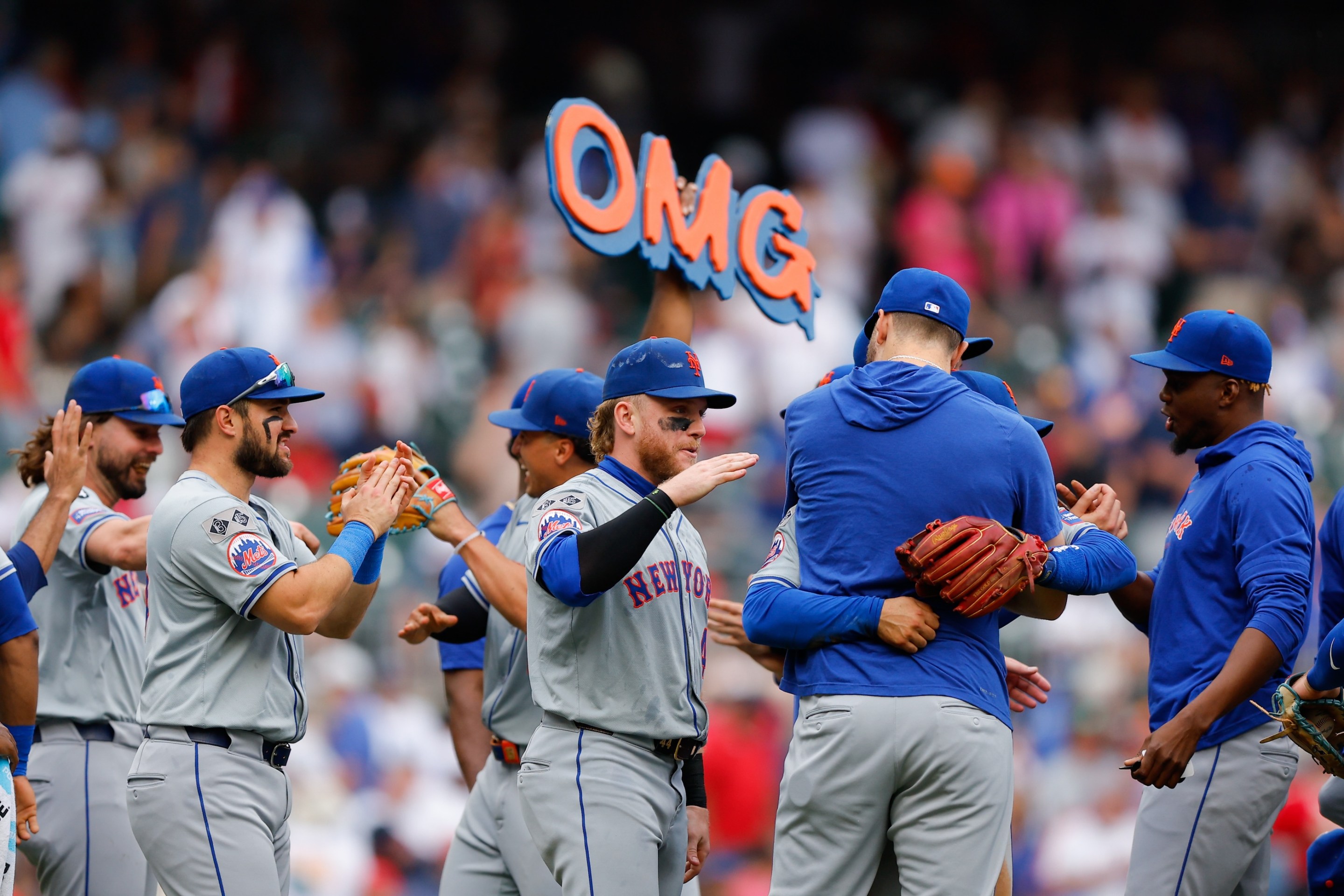There were various scenarios involving the three teams competing for the last two NL Wild Card spots—the Mets, the Braves, and the rapidly deflating Arizona Diamondbacks—that might have made Monday's doubleheader, which made up two games that the NL East rivals were unable to play while Hurricane Helene drenched greater Atlanta, less meaningful. There were some scenarios that might have led the league to remove the games from the schedule entirely for reasons of competitive hygiene. None of those came to pass. The Mets and Braves were more likely to claim those last two spots than the Diamondbacks, but both would be worse off for the labor of earning it—only getting swept would let Arizona ace either one out of the last spot, but a hard-fought split would leave both at a significant disadvantage against better-rested teams in series that would begin the next day. Those incentives would shift for the team that won the first game and steepen for the team that lost it, but both would either fly, in various states of diminution, directly into a pair of road games against better, hotter teams or somehow duff away even that slim chance. Those were the options, and while there were more and less good ways that things could have gone, there wasn't anything that looked much like a clean getaway. As it turned out, both the Mets and the Braves experienced extinction-level worst-case scenarios over the stretch of 12 outs at the end of the first game, and then survived them.
Both, as a reward, will get exactly what they were promised, which was a scrupulously moderate locker-room celebration commemorating having made the postseason and a charter flight to someplace where they seem decently likely to get their asses kicked. The Mets will go to Milwaukee to play the Brewers in a park in which they have gone 4-18 since 2017, and will do so without being able to use their two best relievers for at least one game; Atlanta, which first scratched Cy Young favorite Chris Sale for the second game of Monday's doubleheader and then ruled him out for the entire Wild Card series with back issues, will head to San Diego without a firm starter for Game 1. It could be Ian Anderson, who hasn't pitched in the bigs since 2022; it could be A.J. Smith-Shawver, who threw 4.1 innings for the team this year; it could be Bryce Elder, whose ERA in 10 starts this season begins with a 6. It is very Braves that all those emergency pitchers would be in most big-league rotations, but also none of this is remotely What You Want in terms of setting up a long postseason run.
All of it, after Monday, feels like about the best either team could hope for. Each gave the last full measure for it over the course of one wild game, and then went back out and played another less-dramatic game after that. They'll get the chance to go back to work, which is more than the Diamondbacks got. The accomplishment is both objectively minor and obviously significant; there is nothing to do but pour champagne on it before it starts to tarnish.
"If for some reason you are just joining us and are not aware of what happened in that first game," a notably punchy version of Mets play-by-play guy Gary Cohen recapped during the second inning of Monday's second game, "there were basically four different games played." The first of those unfolded over seven innings in which Spencer Schwellenbach continued to baffle the Mets—the team went .123/.135/.206 against the rookie in 74 plate appearances over three starts; they struck out in 20 of those, walked once, and produced exactly one run—and the Braves pushed three runs across against Mets starter Tylor Megill.
The second happened in the top of the eighth inning, and began in earnest with the Mets' best plate appearance against Schwellenbach all season, an 11-pitch at-bat by Tyrone Taylor that ended with a double and Schwellenbach's departure after 94 pitches. The six-run inning that followed, which came off two of the best pitchers in the Braves bullpen, blew the game open without ever quite putting it out of reach. The third game happened in that inning's bottom half, when Atlanta reclaimed the lead off the Mets' two most effective surviving high-leverage relievers, both of whom were pitching, sweatily, on short rest. Phil Maton, who'd pitched an effortless eighth on Sunday, was much more effortful and less effective on Monday, his third straight day of action; Edwin Diaz, who'd labored through 26 pitches in closing out a 5-0 win against a clinched and mostly checked-out Brewers team on Sunday, was clammy and chaotic in biffing away the lead on Monday, and gave away a crucial out when he failed to cover first on a ball that Pete Alonso saved from becoming a game-breaking double. It is hard to describe the faces that the Mets were making at this point; imagine a staging of those Pepto-Bismol ads in which actors playing Nausea, Heartburn, Indigestion, and Diarrhea do a choreographed dance in which all the dancing symptoms quite clearly believe they are about to die.
The fourth and final game happened in the ninth, when Francisco Lindor reclaimed the lead for the Mets with a two-run homer in the first half and Diaz wobbled his way to getting the job done in the ninth; the closer needed 40 pitches to get his five outs. Lindor, who has been playing through back pain after missing a week of games with presumably even worse back pain, wept on the field after the final out. Asked after the game what he was thinking after his season-saving homer, Lindor answered, "My back hurts, I'm tired." He sat out the second game of the doubleheader; Diaz, after his last two days of excruciating outs, will be down for at least the next one and possibly longer. The win probability graph for the game looks, appropriately, like someone experiencing a severe cardiac event. This would be a good place to admit that, somewhere in those last two innings, I did 33 push-ups for superstitious reasons that are much too normal and cool to go into here, and also because I didn't know what might happen to my body if I didn't.
When the Mets pulled Game 2 starter Joey Lucchesi after 111 pitches over six innings, the team was down 1-0 and his fellow pitchers jumped around and bopped him on the head as if he'd just thrown a shutout. Lucchesi had been DFAed by the Mets after a rocky spot start earlier this year, and he'd accepted the assignment and was removed from the 40-man roster. The alternative was becoming a free agent and punting the rest of a $1.65 million salary, and so he spent the rest of the year pitching, not especially well, as a bulk relief guy at Syracuse before he was added to the roster just before the start of the second game. The outing cut his ERA nearly in half, and saved a bullpen that will be tasked with getting back to work roughly eight hours from now. The Braves won the second game, and while their celebration was notably lower-key than that of the Mets after the first game, they received more or less the same reward. Their series against the Padres will start three hours later than the Mets' against Milwaukee.
That prize is, more or less, a reprieve. Neither will have to wear the shame of fumbling away a chance at as many more days as they can win. Both teams will enter the postseason in different circumstances—the Braves are a true-blue juggernaut temporarily inconvenienced by injuries to its best hitters and pitchers; the Mets are bloated and in-between and trying to chart some kind of course after the collapse of an ill-conceived grasp for a ring—and at something like the same disadvantage. They were shorthanded to begin with, and are much more so after Monday's expenditures; the Braves used closer Raisel Iglesias in both games of the doubleheader, and so will be without him on Tuesday at least. Postseason baseball is a narrowing process, and both teams will arrive in October feeling out of breath and justifiably claustrophobic. It is getting late early out there. But.
I came into Monday's game with a Disaster Scenario in mind; this way of being is not unique to Mets fans, but I imagine it won't come off as bragging when I write that I have some experience in this. That scenario came to pass not once but twice. In the first of those, the Mets were stymied by a pitcher they absolutely can't figure out, exactly as I'd feared they would be. Then they came back, and set up the second cataclysmic outcome, the one in which their best relievers blow the game in a way that will both take them off the board for some crucial period of time and make me knock out sets of push-ups whenever the closer is on the mound. But then they won anyway, and secured a few more games, and the chance at a few more games after that. The Braves, who lost the first game in the same brutal gutshot way that the Mets nearly did, won the same chance by outlasting the Mets' B-team in the second. In the broad sense, this was the scenario that was most likely going into the doubleheader for both teams, and it came to pass as brutally as it possibly could—a worst-case scenario, shared, that arrived as something like a gift. You win another day, and then you do it again. That's how it goes from here until the season runs out, for as many more days of this as you can get.






